新概念二单元练习题(L7-L12)
- 格式:doc
- 大小:101.00 KB
- 文档页数:5
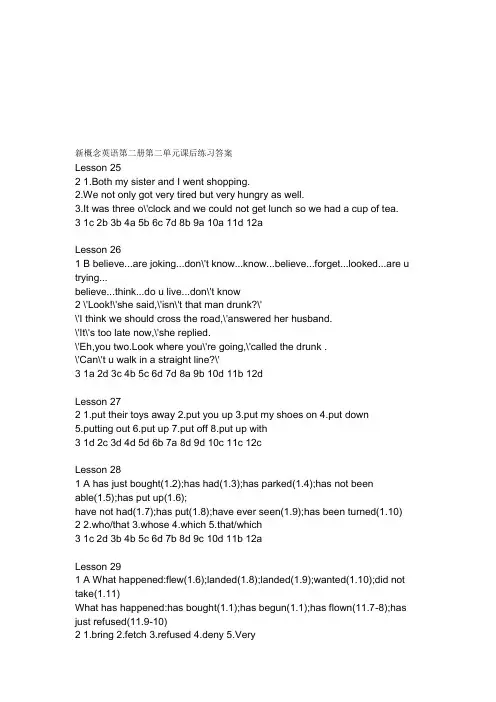
新概念英语第二册第二单元课后练习答案Lesson 252 1.Both my sister and I went shopping.2.We not only got very tired but very hungry as well.3.It was three o\'clock and we could not get lunch so we had a cup of tea.3 1c 2b 3b 4a 5b 6c 7d 8b 9a 10a 11d 12aLesson 261 B believe...are joking...don\'t know...know...believe...forget...looked...are u trying...believe...think...do u live...don\'t know2 \'Look!\'she said,\'isn\'t that man drunk?\'\'I think we should cross the road,\'answered her husband.\'It\'s too late now,\'she replied.\'Eh,you two.Look where you\'re going,\'called the drunk .\'Can\'t u walk in a straight line?\'3 1a 2d 3c 4b 5c 6d 7d 8a 9b 10d 11b 12dLesson 272 1.put their toys away 2.put you up 3.put my shoes on 4.put down5.putting out6.put up7.put off8.put up with3 1d 2c 3d 4d 5d 6b 7a 8d 9d 10c 11c 12cLesson 281 A has just bought(1.2);has had(1.3);has parked(1.4);has not beenable(1.5);has put up(1.6);have not had(1.7);has put(1.8);have ever seen(1.9);has been turned(1.10)2 2.who/that 3.whose 4.which 5.that/which3 1c 2d 3b 4b 5c 6d 7b 8d 9c 10d 11b 12aLesson 291 A What happened:flew(1.6);landed(1.8);landed(1.9);wanted(1.10);did not take(1.11)What has happened:has bought(1.1);has begun(1.1);has flown(11.7-8);has just refused(11.9-10)2 1.bring 2.fetch 3.refused 4.deny 5.Very3 1b 2c 3c 4b 5d 6b 7a 8b 9b 10b 11c 12bLesson 301 D 1.Refrigerators are necessary in hot countries.2.Which river is the longest,the Nile,the Amazon,or the Mississippi?3.Heyerdahl crossed the Pacific on a raft.4.Why is Britain sometimes called the United Kingdom?5.We sailed up the Red Sea and then went through the Suez Canal.2 1a 2a 3d 4a 5b 6c 7c 8c 9d 10a 11d 12dLesson 312 1.experienced 2.jobs 3.job 4.save3 1d 2b 3a 4c 5a 6a 7d 8a 9b 10c 11a 12cLesson 322 One day...a postcard...an excursion...one thing...a fax...a form...a fax of one word...3 1c 2c 3c 4b 5b 6c 7a 8d 9a 10d 11b 12cLesson 331 A 1.The girl set out from the coast.2.She jumped into the sea.3.She seam to the shore.B 1.to 2.from/out of 3.(up)to 4.for/from 5.from...to/to...from6.at7.to8.fromC (sample answers)1.A bird flew into the room.2.The parachutist jumped from the aeroplane.3.The child pointed at the fat lady.4.Put the milk in the refrigerator.2 1.the other day 2.passed 3.next 4.past3 1d 2b 3d 4a 5c 6b 7b 8c 9c 10c 11a 12cLesson 342 1.on 2.off 3.out 4.at3 1d 2a 3b 4c 5a 6d 7c 8b 9c 10b 11c 12aLesson 351 C 1.mean...Do u understand ed to smoke...dose not smoke3.was completed4.have not seen5.dropped...was crossing2 1.so 2.such as 3.so 4.such 5.so 6.such a 7.such an3 1a 2d 3a 4d 5d 6a 7d 8a 9b 10a 11d 12dLesson 361 C 1.We are going to leave at six o\'clock.2.I am going to pay these bills tomorrow.3.Are you going to write to him?4.She is not going to look for a new job.5.When are you going to buy a new car?2 1.firm 2.watched 3.look at 4.aolid/firm 5.firm3 1a 2d 3d 4c 5d 6c 7c 8b 9a 10d 11c 12cLesson 372 1.holding...looking forward to 2.look out 3.look...up4.is holding5.look...up6.held...looking forward to3 1c 2b 3b 4b 5b 6d 7a 8c 9d 10b 11b 12cLesson 382 A 1.I had no sooner left the house than it began to rain.2.We had no sooner hung the picture on the wall than it fell down.B 1.continuously 2.continually 3.country3 1b 2c 3a 4a 5c 6b 7d 8d 9b 10a 11d 12dLesson 391d 2a 3c 4d 5d 6a 7b 8a 9c 10c 11a 12bLesson 401 1.were 2.tries 3.will burn 4.would have to 5.lost6.do not apologize7.were8.won9.would not be 10.could2 1.made...to 2.does...makes 3.doing...making 4.made (i)3 1c 2c 3b 4c 5a 6a 7c 8b 9b 10b 11b 12dLesson 411 C 1.mustn\'t 2.mustn\'t 3.needn\'t 4.needn\'t 5.mustn\'t2 1.remarked 2.noticed 3.remarks 4.notice3 1a 2a 3c 4d 5c 6b 7b 8a 9d 10a 11c 12bLesson 421 A 1.had had a long walk(1.1) 2.have a rest(1.2)3.to have a look(1.4)4.had our first glimpse(1.6)B 1.had a ride 2.was having a look 3.had a wash 4.had am5.had a fight6.have had a quarrel7.had another try8.having a rest9.have a smoke 10.have a good sleep2 1.pick it up 2.pick up 3.pick out 4.pick up3 1d 2d 3d 4b 5b 6c 7d 8d 9a 10c 11d 12aLesson 431 A were able to take(1.3);could...get over(1.6);was then able to rise(1.8); would be able to reach(1.9);was able to fly(1.10)2 1.at last 2.at home 3.at once 4.at the moment5.at times6.was at a loss7.At first3 1b 2b 3a 4a 5d 6d 7a 8c 9c 10d 11a 12cLesson 441 A tried to steal(1.4);started running(1.5);continued to run(1.7);needs mending(1.10)B 1.to see 2.working 3.ironing 4.to leave 5.to argue/arguing 6.to come7.seeing 8.knocking 9.waiting 10.to rain/raining 11.working 12.taking2 1.(sample sentences)In the last minutes orf the race,Jim caught up with the leader and passed him.2.The famer shouted at the children and they ran way.3 1c 2b 3c 4c 5c 6b 7d 8a 9b 10a 11b 12dLesson 451 A had been lost(11.1-2);must have been found(11.3-4);was notreturned(1.4);had been wrapped(1.6);was sent(1.9);was paid back(1.10)C 1.A meal has been prepared for you.2.The book will be translated into English.3.A telegram must be sent to him.4.The fire had been put out before the fire brigade arrived.5.The cat was given some milk to drink.2 1.back 2.robbed...stole 3.back 4.stole 5.robbed3 1b 2d 3a 4b 5b 6d 7c 8b 9c 10b 11d 12bLesson 461 A arrived at Sydney(1.1);could account for the fact(1.3);accurred to one(1.4); was astonished at what(1.5);was so surprised at being(11.6-7);had been confined to the wooden box(1.9);B 1.with 2.to...for 3.with 4.for 5.to 6.at 7.to 8.to9.for 10.to...at 11.at 12.with 13.with 14.to...for 15.for 16.for17.with 18.for 19.at 20.with 21.to 22.with 23.at 24.to25.with...to 26.to...with 27.for 28.to...to 29.for 30.to 31.for 32.to33.to...with 34.for 35.to 36.to 37.at 38.at 39.with 40.for2 1a 2c 3d 4d 5a 6c 7b 8c 9a 10d 11c 12aLesson 471 C 1.will have finished 2.broke 3.were 4.couldD 1.mustn\'t 2.needn\'tE 1.I asked George what those people were looking at.2.George answered that he did not know.He thought a new road was being built and thatit would be finished soon.3.I told George that all those people were silly because they were looking into anempty hole.4.George said that some piople enjoy/enjoyed watching others work.5.Half an hour passed.George told me to hurry up as we had been there for half an hour.He added that there was nothing to see in an empty hole.6.i answered that I didn\'t want to go yet because it was very interesting.2 1d 2a 3b 4a 5d 6a 7a 8d 9d 10c 11a 12cLesson 481 A 1.which 2.denied 3.fetched 4.too 5.jobs 6.One...a...who7.past 8.next 9.watching 10.continually 11.remarked 12.robbedB (sample sentences)I\'m sorry to cause you such trouble.Have you ever seen such beartiful pictures before?It\'s such a nice day that we can\'t stay indoors!I\'m feeling so tired that I shall have to stop work.C 1.He had no sooner come home than they rang him up from the office.2.The plane had no sooner taken off than it returned to the airport.D 1.made 2.do 3.make 4.do 5.Do 6.make 7.made 8.does。
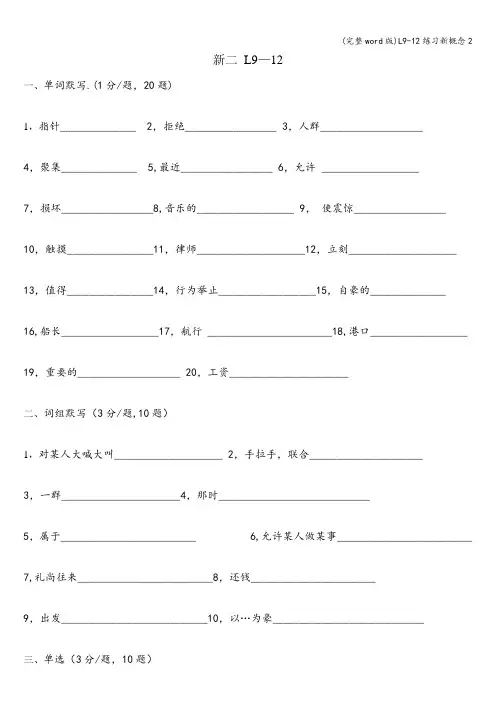
新二L9—12一、单词默写.(1分/题,20题)1,指针______________ 2,拒绝_________________ 3,人群___________________4,聚集______________ 5,最近_________________ 6,允许 __________________7,损坏_________________8,音乐的__________________ 9,使震惊_________________10,触摸________________11,律师____________________12,立刻____________________ 13,值得________________14,行为举止__________________15,自豪的______________16,船长__________________17,航行 _______________________18,港口__________________ 19,重要的___________________ 20,工资______________________二、词组默写(3分/题,10题)1,对某人大喊大叫____________________ 2,手拉手,联合_____________________3,一群______________________4,那时____________________________5,属于_________________________ 6,允许某人做某事_________________________ 7,礼尚往来_________________________8,还钱_______________________9,出发___________________________10,以…为豪____________________________三、单选(3分/题,10题)1, -—What did you do before you came to China?-—I ___in a car factory.A。
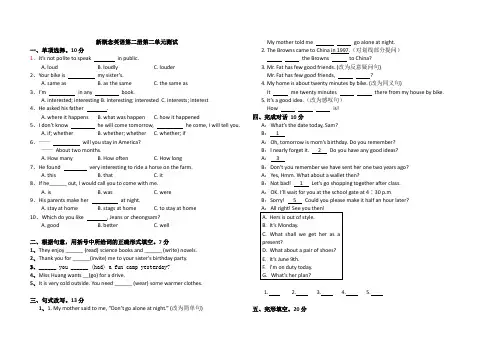
新概念英语第二册第二单元测试一、单项选择。
10分1、It’s not polite to speak in public.A. loudB. loudlyC. louder2、Your bike is my sister’s.A. same asB. as the sameC. the same as3、I’m in any book.A. interested; interestingB. interesting; interestedC. interests; interest4、He asked his father .A. where it happensB. what was happenC. how it happened5、I don’t know he will come tomorrow, he come, I will tell you.A. if; whetherB. whether; whetherC. whether; if6、——will you stay in America?——About two months.A. How manyB. How oftenC. How long7、He found very interesting to ride a horse on the farm.A. thisB. thatC. it8、If he______ out, I would call you to come with me.A. isB. wasC. were9、His parents make her at night.A. stay at homeB. stags at homeC. to stay at home10、Which do you like , Jeans or cheongsam?A. goodB. betterC. well二、根据句意,用括号中所给词的正确形式填空。
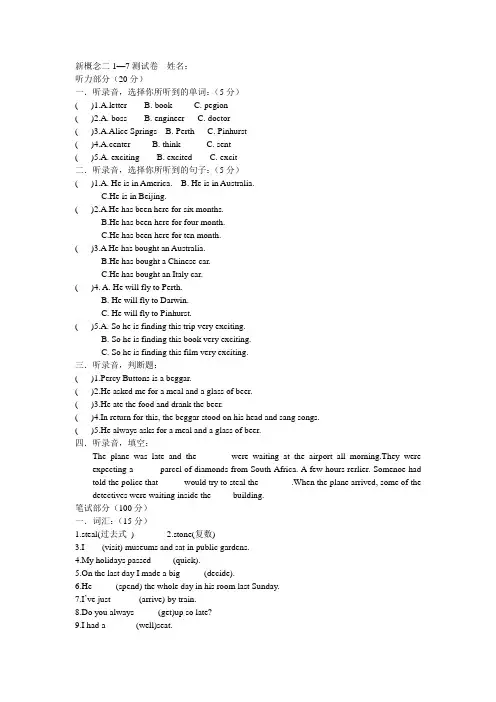
新概念二1—7测试卷姓名:听力部分(20分)一.听录音,选择你所听到的单词:(5分)( )1.A.letter B. book C. pegion( )2.A. boss B. engineer C. doctor( )3.A.Alice Springs B. Perth C. Pinhurst( )4.A.center B. think C. sent( )5.A. exciting B. excited C. excit二.听录音,选择你所听到的句子:(5分)( )1.A. He is in America. B. He is in Australia.C.He is in Beijing.( )2.A.He has been here for six months.B.He has been here for four month.C.He has been here for ten month.( )3.A He has bought an Australia.B.He has bought a Chinese car.C.He has bought an Italy car.( )4. A. He will fly to Perth.B. He will fly to Darwin.C. He will fly to Pinhurst.( )5.A. So he is finding this trip very exciting.B. So he is finding this book very exciting.C. So he is finding this film very exciting.三.听录音,判断题:( )1.Percy Buttons is a beggar.( )2.He asked me for a meal and a glass of beer.( )3.He ate the food and drank the beer.( )4.In return for this, the beggar stood on his head and sang songs.( )5.He always asks for a meal and a glass of beer.四.听录音,填空:The plane was late and the ______ were waiting at the airport all morning.They were expecting a _____ parcel of diamonds from South Africa. A few hours rerlier. Somenoe had told the police that _____ would try to steal the _______.When the plane arrived, some of the detectives were waiting inside the ____ building.笔试部分(100分)一.词汇:(15分)1.steal(过去式)_______2.stone(复数)________3.I____(visit) museums and sat in public gardens.4.My holidays passed_____(quick).5.On the last day I made a big _____(decide).6.He _____(spend) the whole day in his room last Sunday.7.I’ve just ______(arrive) by train.8.Do you always_____ (get)up so late?9.I had a ______ (well)seat.10.I can’t ____(hear) a word.11.The young man said _____(rude).12.The _____(one) lesson is very easy.13.Tom is ____ (she) good friend.14.There are many _______(detective) at the airport.15.Percuy Buttons is a ______(beg).二.选择填空:(30分)( )1.Can you ____ it,sir?A.to describeB. describeC.describe( )st week I ___ to the theatre.A. goB. goingC. went( )3.I had very good_____.A .seat B. sit C sat( )4.The play was very _____.A. interestB. interestedC. interesting( )5.A young man and a young woman ____ sitting behind me.A. beB. wasC. were( )6.I looked at the man and the woman ____.A. angryB. was angryC. angrily( )7.It’s ____ of your business.A. noB. notC. none( )8.I never get up early ____ Sundays.A. inB. atC. on( )9.I sometimes saty ___ bed until lunchtime.A. onB. inC. at( )10.I’ve just arrived here _____.A. take a trainB. by the trainC. by train( )11.He is ____ to see my father.A. to comeB. comeC. coming( )12.Breakfast is the first ____ of the day.A. foodB. dinnerC. meal( )13.Aunt Lucy said,’Dear me,’ because she was ____.A. angryB. surprisedC. tired( )st holiday I went to ____.A. ItalyB. ItaliansC. Italian( )15.A _____ waiter taught me a few words of Italian.A. friendB. friendlyC. friends( )16.Then he lent a book ____ me.A. atB. onC. to( )17.I read _____ lines.A. littleB. a littleC. a few( )18.On the last day I ___a big decision.A.makeB. to makeC. made( )19.Tim is ___ engineer.A. aB. anC./( )20.He has already visited a great number of different ____ in Australia.A. placeB. placesC. home( )21.From there, he will ____ Perth.A. fly inB.fly atC. fly to( )22.He has a new pen and now he just bought ___ pen yesterday.A. the otherB. someC. another( )23.Pinhurst is only five ____ from Silbury.A. mileesC. mils( )24.____ this way, he has began his own private’ telephone service.”A. OnB. ByC.In( )25.Yesterday a begger_____ my door.A. knock atB. knocked overC. knocked at( )26.He asked me a meal and ____ beer.A.two glass ofB. two glassesC. two glasses of( )27.He ____ every house in the street once a month.A. callsB. calls atC. calls in( )28.The detectives __ at the main building all morning yesterday afternoon. .A. are waitingB. is waitingC. were waiting( )29.Two men _____ at the door last Sunday.A. keep guardB. kept guardC. hold guard( )30.The bag _____ the different books.A. is full withB. is full ofC. is filled of三.句型转换:(10分)1. Lucy does her homework in the evening (改为一般疑问句)Lucy her homework in the evening?2. Her mother does the housework on the weekend.(对画线部分提问)her mother on the weekend?3. I go to the movies once a week .(对画线部分提问)you go to the movies?4. Mr Green often takes the train to Hong Kong.(改为同义句)Mr Green often goes to Hong Kong .5. I live 10 kilometers from school. (就划线部分提问)do you live from school?四.补全对话:(5分)A: Excuse me.____.B: Go down this street and turn right . You can see it.A: _____.B: About twenty minutes’ walk.A: Are there any sharks?B: ______ You can see them there.A: ______.B: You’d better takes a bus.A: Thanks a lot.B: _______.A.How far is it from here?B. How can I get there?C. where’s the zoo?D. That’s all right .E. Yes, there are.F. No, there aren’t.五.完形填空:(10分)Everyone in our school loves sports. Every morning 1 we get up, we do morning exercises. After the second class we do exercise again. We only have 2 class twice a week, but we do physical training at five every afternoon. The most popular sport is basketball . The 3__ enjoy playing it and many of the girls like it, too. 4 popular sport is football and in every class there 5 a lot of football fans. We often play volleyball when the weather is 6 .We have school teams in basketball, football and volleyball. Our teams often 7 friendship matches with teams from other schools. When there is a match, 8 of us go to watch it and cheer(欢呼) our side on .Besides(除了)ball games, some of us like track-and-field events(田径项目), 9 we often practice running, jumping and throwing. Every term we have tests in these events and once a year, we hold a sports meeting.Sports help us to keep 10 .( )1. A. while B. when C. before D. after( )2. A. English B. Chinese C. P.E. D. music( )3. A. teachers B. boys C. students D. people( )4. A. Some other B. Other C. Another D. The other( )5. A. are B. is C. were D. was( )6. A. bad B. rainy C. fine D. wet( )7. A. see B. have C. look at D. watch( )8. A. several B. few C. a few D. many( )9. A. because B. but C. or D. and( )10. A. thirsty and hungry B. healthy and happyC. last and tiredD. thin and weak六.阅读理解:(20分)Many children love junk food. It’s bad for their health. Their parents don’t want them to eat too much junk food. Although they know it’s not a good habit, they still eat it. Some of them eat this kind of food every day. Some eat only once or twice a week.Paul is kind of unhealthy. He hardly ever exercises. He eats lots of junk food because he loves it. When he has money, he buys junk food. His parents worry about him. But he says, “Maybe I’m not very healthy, but I enjoy myself.”根据短文内容,判断下列句子的正(T)误(F)( )1. Few children love junk food.( )2. Many parents don’t want their children to eat junk food.( )3. Children know it’s a bad habit to eat junk food.( )4. Paul is very healthy.( )5. Paul often borrows money to buy junk food.BEveryone wants to be healthy. Food is very important. There are a lot of healthy foods. You can eat more apples, bananas, oranges and tomatoes because fruits and vegetables are good for your health. But don’t eat too much chocolate. It’s not healthy food. Healthy food can make you grow and make you strong and happy. Remember there is a saying, “An apple a day keeps the doctor away ”.Sports can also keep you healthy. Get up early and play sports every day. Don’t be lazy! You will be healthy and happy.根据短文内容,选择最佳答案。
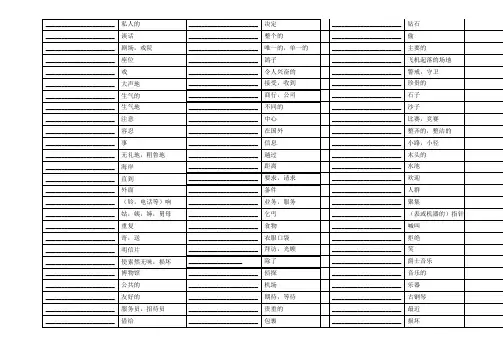
1. 现在进行时:2. 一般现在时:3. 一般将来时:4. 一般过去时:5. 现在完成时:6.过去进行时:三写出时间状语从句的关联词:四:默写各个时态的被动语态的公式:1.2.3.4.5678 情态动词五:翻译下列短语:1.Go to the theatre2.Get angry3.Turn round4.In the end5.Get up6.Pay attention7.What a pity8.Not …until9.Just then10.Public garden11.Teach sb. sth. 16.Make a decision17.Receive a letter from sb.18. A great number of …19.The number of …20. A number of ….21.Take a plane to…22.Fly to…23.In three minutes24.Up to now25.Spare part26.In this way27.Move to28.Knock at29.Ask for30. A glass of31.In return for32.Stand on one’s head33.Go away34.Call at35.Once a month36.Knock off37.Knock out38.Knock over39.By the way40.On the way ]41.In a way42.In the way43.At the airport44.Keep guard45.To one’s surprise46.Be full of47.Enter for48.Hour hand \49.Refuse to do50.At that moment51.Belong to52.Allow sb to do53. A friend of mine54.Be made in55.Be made of56.Be made from57.Be made by六句型转换。
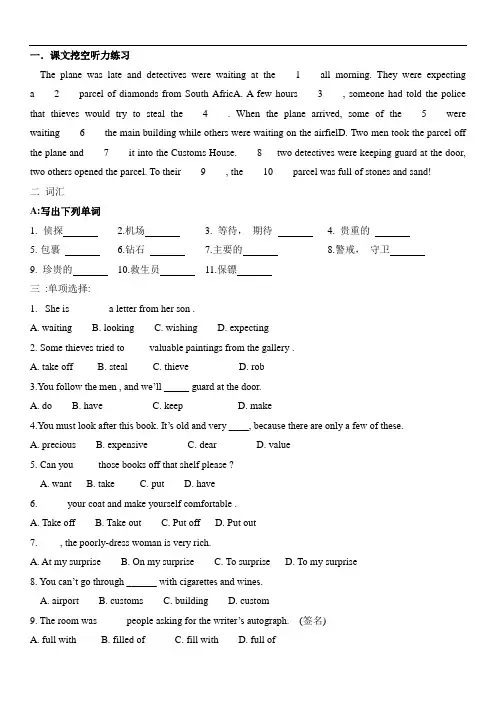
一.课文挖空听力练习The plane was late and detectives were waiting at the____1____all morning. They were expecting a____2____parcel of diamonds from South AfricA. A few hours____3____, someone had told the police that thieves would try to steal the____4____. When the plane arrived, some of the____5____were waiting____6____the main building while others were waiting on the airfielD. Two men took the parcel off the plane and____7____it into the Customs House.____8___two detectives were keeping guard at the door, two others opened the parcel. To their____9____, the____10____parcel was full of stones and sand!二词汇A:写出下列单词1.侦探2.机场3. 等待,期待4. 贵重的5.包裹6.钻石7.主要的8.警戒,守卫9. 珍贵的10.救生员11.保镖三:单项选择:1.She is _______ a letter from her son .A. waitingB. lookingC. wishingD. expecting2. Some thieves tried to ____ valuable paintings from the gallery .A. take offB. stealC. thieveD. rob3.You follow the men , and we’ll _____ guard at the door.A. doB. haveC. keepD. make4.You must look after this book. It’s old and very ____, because there are only a few of these.A. preciousB. expensiveC. dearD. value5. Can you ____ those books off that shelf please ?A. wantB. takeC. putD. have6. _____ your coat and make yourself comfortable .A. Take offB. Take outC. Put offD. Put out7. ____, the poorly-dress woman is very rich.A. At my surpriseB. On my surpriseC. To surpriseD. To my surprise8. You can’t go through ______ with cigarettes and wines.A. airportB. customsC. buildingD. custom9. The room was _____ people asking for the writer’s autograph. (签名)A. full withB. filled ofC. fill withD. full of10. It is said that the most precious diamonds are from ___.A. Southern AfricaB. the South AfricaC. South AfricaD. South African11. The people ___ the small village when it was getting dark.A. got inB. arrived inC. got toD. got at12. The sports team _____ Athens (雅典) in the early morningA. arrived inB. arrivedC. gotD. reached to13. He is very busy , so don’t ___ him to stay here for longer than a week .A. waitB. wakeC. wantD. expect14. The plane ____ safely . They stood and watched until it was out of sight .A. landedB. took awayC. took offD. take off15.There is a _____ look on his face.A. surpriseB. surprisingC. surprised D surprises四语法复习:将下列两个句子合并成一个,用正确的时态(过去进行时)1.We expected a letter from Mary. Mary came to visit us . (when )________________________________________________________________________________ 2.Two detectives kept guard at the door. Then two others opened the parcel. (when )________________________________________________________________________________ 3.I took a walk with my friend . We met our old teacher . (when )________________________________________________________________________________ 4.The lazy boy lay in bed . His sister was doing exercises outside. (while )________________________________________________________________________________ 5.The girl played the violin at home . We enjoyed ourselves outside. (while )________________________________________________________________________________ 6. A car knocked the boy over .He was beginning to cross the road.(as)________________________________________________________________________________ 7.I spilt some tea on my clean clothes. I was getting ready to go out .(just as )________________________________________________________________________________ 五翻译句子1.令我们吃惊的是,十个警察在守卫大门。
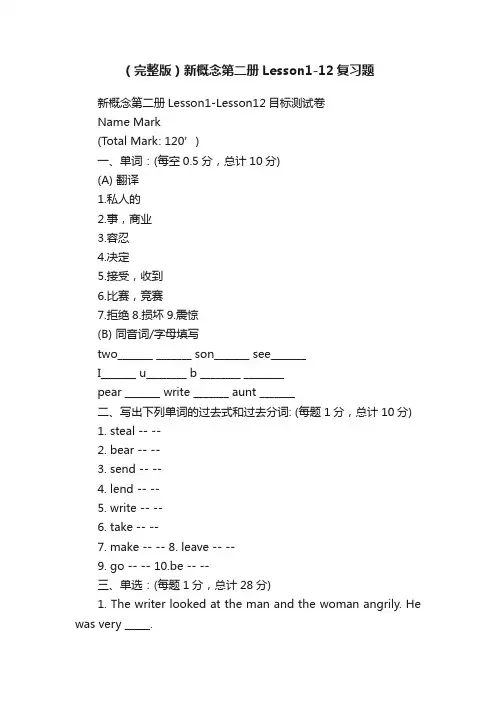
(完整版)新概念第二册Lesson1-12复习题新概念第二册Lesson1-Lesson12目标测试卷Name Mark(Total Mark: 120’)一、单词:(每空0.5分,总计10分)(A) 翻译1.私人的2.事,商业3.容忍4.决定5.接受,收到6.比赛,竞赛7.拒绝8.损坏9.震惊(B) 同音词/字母填写two_______ _______ son_______ see_______I_______ u________ b ________ ________pear _______ write _______ aunt _______二、写出下列单词的过去式和过去分词: (每题1分,总计10分)1. steal -- --2. bear -- --3. send -- --4. lend -- --5. write -- --6. take -- --7. make -- -- 8. leave -- --9. go -- -- 10.be -- --三、单选:(每题1分,总计28分)1. The writer looked at the man and the woman angrily. He was very _____.A. sadB. unhappyC. crossD. pleased2. The writer could not bear it. He could not _____ it.A. carryB. sufferC. standD. lift3. He calls at every house in the street. He _____ everyone.A. shouts atB. callsC. cries out atD. visits4. ______ does he call? Once a month.A. How seldomB. How longC. How soonD. How often5. Two men took the parcel off the plane. They ______.A. took off itB. it took offC. took offD. took it off6. Joe wins every time. He always _____ Bill Frith.A. winsB. beatsC. gainsD. earns7. --_____ will it strike ? --In twenty minutes’ time.B. How longC. How long agoD. How much8.-- How are the team playing?--They’re playing well, but one of them _____ hurt.A. gotB. getsC. areD. were9. I shouted at Bob just now, but he _____ at that time.A. was listening to musicB. has been listening to musicC. has listened to musicD. listened to music10. – Can I help you, sir?--Yes, I bought this radio here yesterday, but it _____.A. didn’t workB. won’t workC. can’t workD. doesn’t work11. I know a little bit about Italy as my wife and I ______ there several years ago.A. are goingB. had beenC. wentD. had12. There’s ______ dictionary on ______ desk by your side.A. a; theB. a; aD. the; the13. Make sure you’ve got the passport and tickets and _____ before you leave.A. somethingB. anythingC. everythingD. nothing14. A new cinema _____ here. They hope to finish it next month.A. will be builtB. is builtC. has been builtD. is being built15. The police _____ walking _____ the road.A. are …pass B .is… past C. were…pass D. were…past16. The football match last night was very _____.A. excitingB. excited C .excite D. exit17. ______ Friday evenings, we usually go to see a film.A. AtB. OnC. InD. When18.“A quarter _____ 10”means “nine forty-five”A. toB. forC. pastD. passed19. He plays _____ piano very well and has won some awards.A. aB. theC. anD. /20. When he gets here tomorrow, I will pick him up _____ the airport.A. atB. inC. onD. by21. Jane has two brothers; one is John, and _____ is Henry.A. anotherB. the othersC. the otherD. other22. She is _____ than any other students.A. cleverB. cleverestC. clevererD. the clever23. He _____ to Beijing in two days.A. will flyB. flewC. fliesD. was fly24. Would you like _____ bread?A. someB. anyC. noD. every25. My brother enjoy _____ basketball very much.A. playingB. playC. to playD. played26. Listen!Somebody was knocking _____ the door.A. atB. inC. offD. out27. Up till now, I _____ him for three times.A. have calledB. has calledC. calledD. calls28. Everybody _____ Tom.A. knowB. knowsC. knowD. known四、改写下列句子,用what来引导下列感叹句(总计3分)1. This is a wonderful garden!2. He’s a rude person.3. They’re beautiful pictures.五、按照例句改写以下句子(总计3分)(eg.) He lent a book to me last week. He lent me a book last week.1. I bought you this bunch of flowers. →2. She showed her husband her new hat. →3. He paid the shopkeeper some money. →六、句型转换(将下面句子改成否定句和一般疑问句)(总计6分)1. He has washed the dishes.2. She has made the beds.3. I’ve taken my holidays.七、用括号中动词的正确形式填空(总计5分)1. When you (lose)your umbrella?2. We ________ just (win) the match.3. you _________ (burn) those old papers yet?4. Tom (work) in the garden while I (sit) in the sun.5. He usually (get) up at 7 o’clock, but this morning he _____ (get) up at 6 o’clock.八、选用正确的词填空(总计5分)1. Can you move that chair please? It’s .(in my way/ on my way)2. My mother a cake for us. (made / did)3. I stopped to the station to buy a book. (in the way/ on the way)4. We usually do the job . (by the way/ in this way)5. I a letter from my brother last week. (received/ took)九、用括号中的正确形式填短文(总计10分)My friend, Roy, (die) last year. He (leave) me his CD player and his collection of CDs. Roy (spend) a lot of money on CDs. He (buy) one or two new CDs every week. He never (go) to the cinema or to the theatre. He (stay) at home every evening and (listen) to music. He often (lend) CDs to his friends. Sometimes they (keep) them. He ____ (lose)many CDs in this way.十、用适当的介词填空(in, on, during, at, until)(总计5分)1. He has gone abroad. He will return two years’ tim e.2. I shall not hear from him tomorrow.3. I can’t see him the moment. I’m busy.4. Nicky’s birthday is October 31st. He was born 1970.5. The days are very short December.十一、根据要求写句子(每小题1分,总分14分)1. There are some milk in the fridge.(改成否定句)2. There are two birds in the tree.(对画线部分提问)3. I can swim.(对画线部分提问)4. He can play the piano.(改成一般疑问句并作否定回答)5. She likes dogs . (改成一般疑问句并作肯定回答)6. They have some telescopes.(对划线部分提问)7. They, like , buy , some ,for , Halloween, would , to, things,a , party(连词成句)8. I’d like a cup of tea.(对划线部分提问)9.They are twenty yuan.(对划线部分提问)10. He reads English every morning.(改为否定句)11. His piano has belonged to our family for a long time. (翻译)12. The news listened to I carefully13. We at home stay on Sundays14. A new school built they in our village last year.十二.阅读理解(总计10分)Do you feel a little sleepy after lunch? Well, that’s normal. Your body slows down then. What should you do about it? Don’t reach for a coffee! Instead, take a nap(小睡). It’s good to have a daily nap. First of all, you are more efficient(有效的) after napping. You remember things better and make a fewer mistakes. Also, you can learn things more easily after taking a nap. A nap may increase your self-confidence(自信) and make you more active. It may even cheer y ou up. But, there’re some simple rulesyou should follow about taking a nap. First, take a nap in the middle of the day, about eight hours after you wake up. Next, a 20-minute nap is best. If you sleep longer, you may fall into a deep sleep. After waking from a deep sleep, you will feel worse. Also, you should set an alarm clock. That way, you can fully relax during your nap. You won’t have to keep looking at the clock so you don’t oversleep.Now, the next time you feel sleepy after lunch, don’t get dressed. Put your head down, and close your eyes.1.It is _____ to get sleepy for you at noon.A.normalB. strangeC. amazing2.After taking a nap, you may feel _____.A.stressedB. confidentC. sleepy3.The proper period(一段时间) of time for taking a nap is _____.A.as long as you likeB. eight hoursC. about twenty minutes4.What can help you have a fully relaxing nap according to the passage?A. A cup of coffee.B. A quick meal.C. An alarm clock.5.What is the text mainly about?A.Why and how to take a nap.B.Rules to increase your confidence.C.How to make your body slow down.十三.作文What do you want to do in the future? (总计11分)————————————————————————————————————————————————————————————————————————————————————————————————————————————————————————————————————————————————————————————————————————————————————————————————————————————————————————————————————————————————————————————————————————————————————————————————————————————————————————————————————————————————————————————————————————————————————————————————————————————————————————。
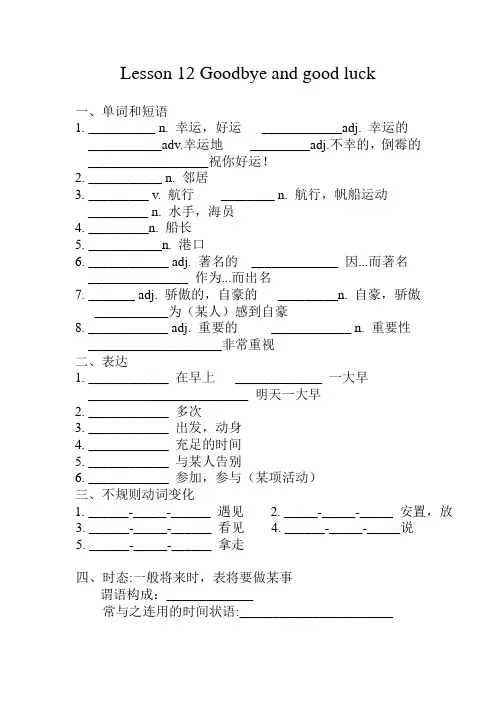
Lesson 12 Goodbye and good luck一、单词和短语1.__________ n. 幸运,好运____________adj. 幸运的___________adv.幸运地_________adj.不幸的,倒霉的__________________祝你好运!2.___________ n. 邻居3._________ v. 航行________ n. 航行,帆船运动_________ n. 水手,海员4._________n. 船长5.___________n. 港口6.____________ adj. 著名的_____________ 因...而著名_______________ 作为...而出名7. _______ adj. 骄傲的,自豪的_________n. 自豪,骄傲___________为(某人)感到自豪8. ____________ adj. 重要的____________ n. 重要性____________________非常重视二、表达1.____________ 在早上_____________ 一大早________________________ 明天一大早2.____________ 多次3.____________ 出发,动身4.____________ 充足的时间5.____________ 与某人告别6.____________ 参加,参与(某项活动)三、不规则动词变化1.______-_____-______ 遇见2. _____-_____-_____ 安置,放3. ______-_____-______ 看见4. ______-_____-_____说5. ______-_____-______ 拿走四、时态:一般将来时,表将要做某事谓语构成:_____________常与之连用的时间状语:_______________________五、翻译下列句子。
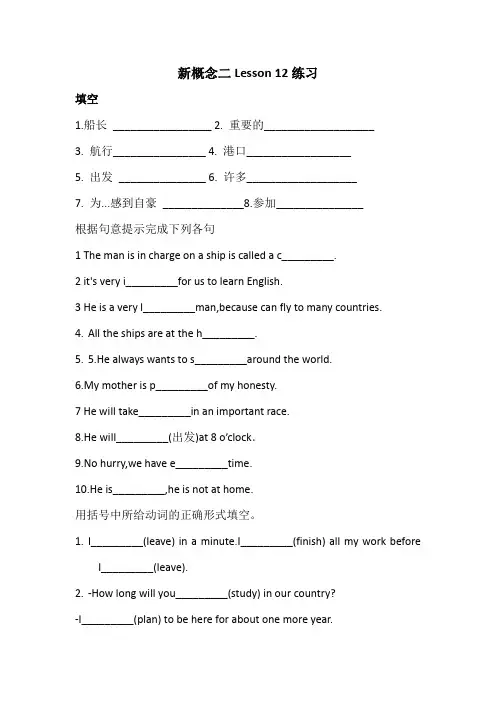
新概念二Lesson 12练习填空1.船长_________________2. 重要的___________________3. 航行________________4. 港口__________________5. 出发_______________6. 许多___________________7. 为...感到自豪______________8.参加_______________根据句意提示完成下列各句1 The man is in charge on a ship is called a c_________.2 it's very i_________for us to learn English.3 He is a very l_________man,because can fly to many countries.4.All the ships are at the h_________.5.5.He always wants to s_________around the world.6.My mother is p_________of my honesty.7 He will take_________in an important race.8.He will_________(出发)at 8 o’clock.9.No hurry,we have e_________time.10.He is_________,he is not at home.用括号中所给动词的正确形式填空。
1.I_________(leave) in a minute.I_________(finish) all my work beforeI_________(leave).2.-How long will you_________(study) in our country?-I_________(plan) to be here for about one more year.3.I_________(be)tired.I_________(go) to bed early tonight.4. Mary's birthday is next Monday. Her mother_____(give) her a present.5. It is very cold these days. It??_________(snow)soon.6.-Will you_________(be)here this Saturday?-No.I??_________(visit) my teacher.7.-Shall I_________(get)you a copy of today's newspaper?-Thank you8.I am afraid there______(be) a meeting this afternoon. I can't join you.9.Mike won’t_________(believe)this until he _________(see) it with hisown eyes.10.Most of us don’t think their ream_________(win).句型转换。
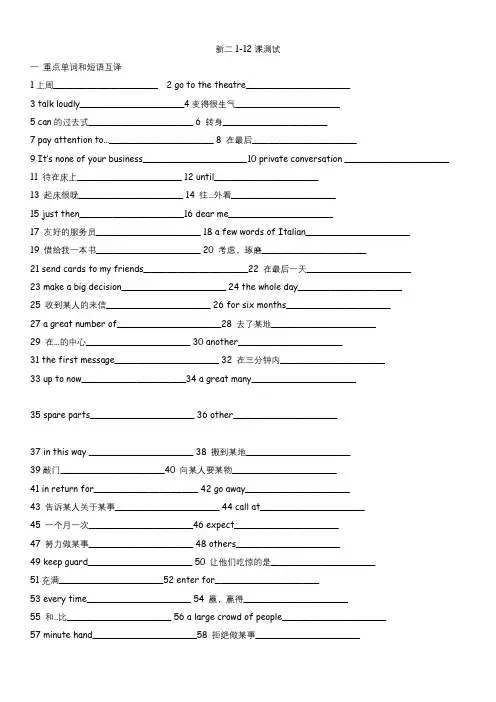
新二1-12课测试一重点单词和短语互译1上周___________________ 2 go to the theatre___________________3 talk loudly___________________4变得很生气___________________5 can的过去式___________________6 转身___________________7 pay attention to…___________________ 8 在最后___________________9 It’s none of your business___________________10 private conversation ___________________ 11 待在床上___________________ 12 until___________________13 起床很晚___________________ 14 往…外看___________________15 just then___________________16 dear me___________________17 友好的服务员___________________ 18 a few words of Italian___________________19 借给我一本书___________________ 20 考虑,琢磨___________________21 send cards to my friends___________________22 在最后一天___________________23 make a big decision___________________ 24 the whole day___________________25 收到某人的来信___________________ 26 for six months___________________27 a great number of___________________28 去了某地___________________29 在…的中心___________________ 30 another___________________31 the first message___________________ 32 在三分钟内___________________33 up to now___________________34 a great many___________________35 spare parts___________________ 36 other___________________37 in this way ___________________ 38 搬到某地___________________39敲门___________________40 向某人要某物___________________41 in return for___________________ 42 go away___________________43 告诉某人关于某事___________________ 44 call at___________________45 一个月一次___________________46 expect___________________47 努力做某事___________________ 48 others___________________49 keep guard___________________ 50 让他们吃惊的是___________________51充满___________________52 enter for___________________53 every time___________________ 54 赢,赢得___________________55 和..比___________________ 56 a large crowd of people___________________57 minute hand___________________58 拒绝做某事___________________59 在那一刻___________________ 60 属于某人___________________61 演奏…___________________ 62 我爸爸的一个朋友___________________ 63 从某人借某物___________________64 pay back___________________ 65 pay for___________________ 66 一大早___________________67 许多次___________________ 68 充足的,大量的___________________ 69 为…而自豪___________________70 take part in___________________ 二用a, some, any填空1.There are___________________ books on the desk.2.I drank ___________________ glass of beer.3. Do you want___________________ butter?4. There aren’t ___________________ people in the street.5. We have ___________________ apple trees in our garden.6.Would you like___________________ milk?7.Is there___________________ water in that bottle?三选择1. ___________________ did he feel? Angry.A WhereB WhyC HowD When2.He looked at___________________ angrily.A themB theyC theirD its3.He sometimes ___________________ in bed late.A stayB is stayingC staysD staying4.He went___________________ bed late.A inB intoC toD at5. ___________________did she come? By train.A WhereB WhyC HowD When6.He was ___________________ Italy last summer.A inB onC toD at7. ___________________ him s few words of Italian? Lucy.A Who teachesB Who does teachC Who teachD Who do teach8.He was a ___________________ waiter.A friendB friendlyC friendy9.Tim has been in the U.S. ___________________ six months.A inB atC onD for10.The book is___________________.A to himB of himC hisD him11.When did he ___________________ them yesterday?A boughtB buyC buysD buying12. He run one hundred metres ___________________ thirteen seconds.A inB atC onD for13.She gives ___________________.A to him a mealB a meal for himC him to a mealD a meal to him14.Everybody ___________________ him.A knowB knowsC is knowingD are knowing15.The teacher is waiting___________________A inB intoC insideD for16.They ___________________A took off itB it took offC took offD took it off17.He works ___________________ than Joe.A harderB more harderC more hardly18.They go to school___________________A in morningB on the morningC morningD in the morning19.It is ___________________ Day.A Teacher’sB Children’sC Mothers’D Work’s20.She is working at a bank___________________A last yearB for a yearC nowD at now21.I ___________________ lend me some money.A want toB wantC want you toD you want to四用所给词的适当形式填空1. The children always___________________(play) football here.2. I look out of the window, some children ___________________(play) football here.3. ---What ________________ you ________________? (do) ---I am leaving.4. ________________he often________________(go) to work late?5.Jack ________________ (buy) a house last year. He ______________ (live) in the house for one year.6.While he________________(read) the letter, he ________________(hear)a knock at the door.7.She is ________________ (tall) girl in the class, she is ________________(tall) than some boys.8.My watch ________________ (make) in Japan.9.Our teacher________________(be) in Beijing tomorrow.10.I am going out now, I ________________(come) back later.。
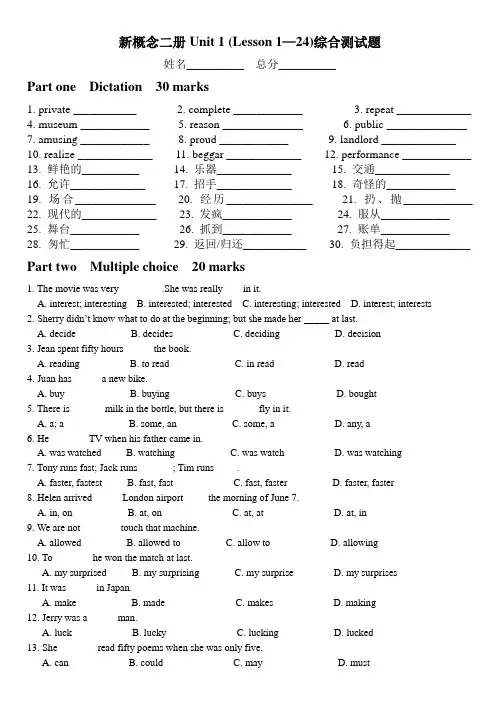
新概念二册Unit 1 (Lesson 1—24)综合测试题姓名__________ 总分__________Part one Dictation 30 marks1. private ___________2. complete ____________3. repeat _____________4. museum ____________5. reason ______________6. public ______________7. amusing ____________8. proud ____________9. landlord _____________ 10. realize _____________ 11. beggar _____________ 12. performance ____________ 13. 鲜艳的__________ 14. 乐器_____________ 15. 交通_____________ 16. 允许_____________ 17. 招手_____________ 18. 奇怪的____________ 19. 场合______________ 20. 经历_______________ 21. 扔、抛____________ 22. 现代的_____________ 23. 发疯____________ 24. 服从____________ 25. 舞台____________ 26. 抓到____________ 27. 账单____________ 28. 匆忙____________ 29. 返回/归还___________ 30. 负担得起_____________ Part two Multiple choice 20 marks1. The movie was very________ .She was really ___ in it.A. interest; interestingB. interested; interestedC. interesting; interestedD. interest; interests2. Sherry didn’t know what to do at the beginning; but she made her _____ at last.A. decideB. decidesC. decidingD. decision3. Jean spent fifty hours _____ the book.A. readingB. to readC. in readD. read4. Juan has _____ a new bike.A. buyB. buyingC. buysD. bought5. There is ______ milk in the bottle, but there is ______ fly in it.A. a; aB. some, anC. some, aD. any, a6. He _______ TV when his father came in.A. was watchedB. watchingC. was watchD. was watching7. Tony runs fast; Jack runs ______ ; Tim runs ____.A. faster, fastestB. fast, fastC. fast, fasterD. faster, faster8. Helen arrived _____ London airport ____ the morning of June 7.A. in, onB. at, onC. at, atD. at, in9. We are not _______ touch that machine.A. allowedB. allowed toC. allow toD. allowing10. To _______ he won the match at last.A. my surprisedB. my surprisingC. my surpriseD. my surprises11. It was _____ in Japan.A. makeB. madeC. makesD. making12. Jerry was a _____ man.A. luckB. luckyC. luckingD. lucked13. She _______ read fifty poems when she was only five.A. canB. couldC. mayD. must14. She ______ last year.A. give up smokingB. give up smokeC. gave up smokingD. give up smoking15. It _________ be my son. He has gone to America.A. mustB. mustn’tC. canD. can’t16. The cake is made _________ flour, butter, eggs and sugar.A. ofB. fromC. byD. in17. I don't like them so I bought _______ them.A. neither ofB. neitherC. both ofD. both18. —I’m sorry sir. The tickets have been sold out.—________A. What a pity!B. Certainly.C. May I have two tickets?D. You’re welcome.19. Tomorrow is my mother’s birthday? I’ll buy her _______.A. something specialB. anything specialC. special somethingD. special anything20. Traffic police never let you _______ without a ticket.A. goB. to goC. goingD. have gonePart three Fill in the blanks with proper prepositions 5 marks1. ______ spite of this, she often appears on the stage as a young girl.2. He’s lived in the small house _______ 30 years.3. Sometimes I think this house will be knocked _________ by a passing plane.4. Last week I went to my hometown ________ train.5. I met my English teacher _______ the way home yesterday.Part four Choose correct word to fill in the blanks 20 marks1. It is a _________ of time to do that kind of thing.2. She ________ five days on the work.3. We waited(等) and waited, but the little mouse didn’t _________.4. Susan didn’t ___ __ watching that film.5. John works in a foreign compa ny but he doesn’t get a good _____ _____.6. Chong qing is _ _____ for its hot pot(火锅).7. A young man waved to me. I stopped and he asked me for a ____________.8. The house is so expensive that Sherry can’t _____ it.9. Sharon is a __ ____ girl. She always smiles(微笑) when she speaks to others.10. The boy’s parents are ______ of him; he always studies hard .Part five Cloze 15 marksMr. White works in an office. He liked __1__ in bed when he was at school. It was bad for his eyes and now he has near sight(近视眼). But he wouldn't like anybody else to know about __2__and he never wears a pair of glasses, and it often __3__ him some trouble.One winter morning he was sent to a village school on business. He __4___the bus at a stop in a small town. Then he had to __5___ there. The road to the village wasn't smooth(平坦). He fell over(摔倒了) some times and it made his clothes dirty. When he___6___ got to the village, it began to blow(刮风) and it got__7__. He was looking for the school while his ___8___was blown off(吹走了). He began to run after it but he couldn't get it. He couldn't understand why his hat ran into a house as if(就像,好像) it had __9__. And he ran into the house, too.A woman stopped him and shouted angrily, "__10__are you running after my hen(鸡) for?"Choose the best answer according to the passage1. A. reading B. dancing C. singing D. writing2. A. these B those C. them D. it3. A. follows B takes C. brings D. carries4. A. took off B got off C. got on D. come on5. A. ride B drive C. walk D. fly6. A. at first B .at home C. at times D. at last7. A. hotter B. warmer C. colder D .cooler8. A. clothes B. bag C. hat D. glasses9. A. legs B. hands C. shoes D. arms10. A. What B. Why C. Which D. WhoPart six Readings 20 marks(A)Some ants(蚂蚁) make their homes under a stone(石头). If the weather is warm, you may see many ants under the stone. If the weather is cold, many ants will be in their house under the ground(地面).Most of the ants are workers. They are very busy. They look for food and take care of the young ants. Each family of ants has a queen ant. The queen ant doesn't work. She is important because she lays eggs(产卵). Those eggs will become baby ants.There are many kinds of ants in America. One kind of these is very strong. People are afraid of it, and animals are afraid of it, too.These ants move in groups. They eat all the animals on their way. They can kill and eat elephants, and they can eat wooden houses. When the ants come near, people leave their homes. But people are sometimes glad after the ants pass through(通过,经过), because they will see no other insects(昆虫) or snakes.1. Where can you find ants on warm days? ________A. Under the ground.B. On the ground.C. Inside people's houses.D. Under a stone.2. Why is a queen ant more important than a worker ant? Because _________A. a queen ant produces(生产) the youngB. a queen ant is stronger than all the other family membersC. a queen ant finds food for all the other family membersD. a queen ant does more work than all the other family members3. Where can you find many kinds of ants according to the passage?__________A. In America.B. In China.C. In Canada.D. In Britain.4. Why are people glad after the dangerous ants pass through? ___________A. Because they are goneB. Because they are not dangerous any moreC. Because there are no other insects or snakesD. Because the ants can be eaten5. Which of the following is true? __________A. People are not afraid of any kind of ant.B. Big animals are not afraid of any kind of ant.C. An elephant can kill and eat a kind of very strong ant.D. One kind of ants moves in groups.(B)Tom Green spent his 114th birthday the other day and some reporters visited him to find out the secret(秘密) of a long life.“The secret of a long life is happiness,” Green said. “If you are happy, you will live a long time.”“Are you married?” a reporter asked. “Yes,” Green answered. “I married my third wife when I was 102. If you are happily married, you will live better. But for my third wife, I would have died years ago.”“What about smoking and drinking?” another reporter asked. “Yes, they are important,” Green said. “Don’t smoke at all and you will feel well. Drink two glasses of wine(酒) a day and you will be healthy and happy. ”1.Some reporters visited Green because___________A. he did something peculiarB. he was a friend of themC. he had lived much longer than most peopleD. he had married three times2. Green thought that was the most important to life. ________________A. his third wifeB. gladC. happinessD. smoking3.Green thought his third wife helped him to live _________ years longer.A.12B.14C.16D.184. The writer wants to tell us ____________A. drinking a lot is good for our healthB. drinking within a limit(限制) is helpfulC. smoking is good to healthD. we should give up smoking or drinking.5. The best title(标题) for this passage is ____________A. Drinking and SmokingB. The Secret of a Long LifeC. Happiness in LifeD. Astonished(令人感到惊讶的) ReportersPart seven Translations 20 marks1. Last year, however, the airport came into use.___________________________________________________________.2. I hurried to the ticket office.___________________________________________________________.3. She must be at least thirty-five years old.___________________________________________________________.4. He always borrows money from his friends and never pays it back.___________________________________________________________.5. He told me that the firm could not afford to pay such large salaries.___________________________________________________________.新概念二册Unit 1 (Lesson 1—24)综合测试题(答案)Part one Dictation 30 marks(答案略,参照书本)Part two Multiple choice 20 marks1-5:CDADC 6-10:DABBC 11-15:BBBCD 16-20:BAAAAPart three Fill in the blanks with proper prepositions 5 marks1.In2. for3. down4. by5. onPart four Choose correct word to fill in the blanks 20 marks1. waste2. spent3. appear4. enjoy5. salary6. famous7. lift8. afford9. polite 10. proudPart five Cloze 15 marks1-5: ADCBC 6-10: DCCAAPart six Readings 20 marks(A) 1-5: DAACD (B) 1-5: CCABBPart seven Translations 20 marks1. 但是去年这个机场投入使用了。
新概念2练习册英语答案新概念英语第二册是一套广泛使用的英语教材,它以实用和趣味性著称,适合不同水平的英语学习者。
以下是新概念英语第二册练习册的一些练习题及答案,供学习者参考。
练习一:词汇练习题目:根据上下文填写适当的单词。
1. I am very _______ (高兴的) to receive your letter.2. She is _______ (擅长) playing the piano.3. The _______ (天气) is very cold today.4. He _______ (忘记) his keys at home.答案:1. happy2. good at3. weather4. left练习二:语法练习题目:用括号中所给词的正确形式填空。
1. She _______ (be) a teacher since 2010.2. I _______ (not finish) my homework yet.3. They _______ (go) to the park if it _______ (not rain) tomorrow.4. He _______ (be) to Paris three times.答案:1. has been2. haven't finished3. will go, doesn't rain4. has been练习三:阅读理解题目:阅读下面的文章,然后回答问题。
文章:Tom is a young man who loves to travel. Last year, he went to Paris for the first time. He visited the Eiffel Tower and the Louvre Museum. He also enjoyed the French cuisine. Tom was amazed by the beauty of the city and the friendliness of the people. He plans to return to Paris next year.问题:1. Who is Tom?2. Where did Tom go last year?3. What did he do in Paris?4. What does Tom think of Paris?答案:1. Tom is a young man who loves to travel.2. Tom went to Paris last year.3. He visited the Eiffel Tower and the Louvre Museum, and enjoyed the French cuisine.4. Tom thinks Paris is beautiful and its people are friendly.练习四:写作练习题目:写一篇短文,描述你上个周末的活动。
【导语】新概念英语作为⼀套世界闻名的英语教程,以其全新的教学理念,有趣的课⽂内容和全⾯的技能训练,深受⼴⼤英语学习者的欢迎和喜爱。
®⽆忧考⽹为您提供,希望以下内容能够为⼤家的新概念英语学习提供帮助!新概念英语第⼆册单元测试1答案⼤全: A 1. He is busy. 2. He is learning English. 3. He has a new book. 4. He lives in the country. 5. He will see you tomorrow. 6. He can understand you. 7. He must write a letter. 8. He may come next week. 9. He does a lot of work every day. 10. He did a lot of work yesterday. 11. He played football yesterday. 12. He bought a new coat last week. 13. He has had a letter from Tom. 14. He was busy this morning. 15. He could play football very well when he was younger. 16. He always tries to get up early. 17. He might see you next week. 18. He always enjoys a good film. 19. He had finished his work before you came. 20. He watches television every night. B 1.some 2.a 3.any 4.any 5.a 6.some 7.a 8.any 9.any 10.any C 1、I haven't got much butter. 2.You haven't got many cigarettes. 3.We haven't got much milk. 4.She hasn't got many biscuits. 5.They haven't got much stationery. D 1、bought 2.aired 3.lost 4.listened 5.emptied E 1、Q. Did he buy a new car? Q. What did he buy? N. He didn't buy a new car. 2.Q. Can she come tomorrow? Q. When can she come? N. She can't come tomorrow. 3.Q. Were they here yesterday? Q. When were they here? N. They weren't here yesterday. 4.Q. Must he leave early? Q. Why must he leave early? N. He mustn't leave early. 5.Q. Did he give you a pen? Q. What did he give you? N. He didn't give you a pen. 6.Q. Does he live next door? Q. Where does he live? N. He doesn't live next door. 7.Q. Do you know him well? Q. How well do you know him? N. You don't know him well. 8.Q. Has he found his pen? Q. What has he found? N. He hasn't found his pen. 9.Q. Did you see that film? Q. When did you see that film? N. You didn't see that film. 10.Q. Did he arrive at two o'clock? Q. When did he arrive? N. He didn't arrive at two o'clock. F 1、slowly zily 3.badly 4.carefully 5.suddenly G 1、He'll... 2.She'll... 3.I'll... 4.He won't ... 5.We shan't... H 1、his 2.mine 3.hers 4.theirs 5.yours I 1、cooler 2.wetter ter 4.easier 5.more expensive rger 7.more interesting 8.prettier 9.more beautiful 10.more intelligent J 1、yesterday 2.tomorrow 3.today 4.this afternoon 5.the day after tomorrow 6.the day before yesterday st night 8.tomorrow morning 9.this morning 10.yesterday afternoon K 1、at 2.on 3.in 4.in 5.on L 1、over 2.under 3.across/in 4.along 5.on 6.in 7.off 8.between 9.into 10 .out of M 1、hich 2.Who 3.Which 4.Who 5.Which N 1、This is the car which the mechanic repaired yesterday. 2.He is the man whom I invited to the party. 3.These are the things which I bought yesterday. 4.He is the man who came here last week. 5.He is the policeman who caught the thieves. 6.She is the nurse who looked after me. 7.She is the woman whom I met yesterday. 8.I am the person who wrote to you. 9.They are the people whom I saw yesterday. 10.They are the trees which we cut down yesterday. O 1、knives 2.boxes 3.shelves 4.wives 5.dishes P 1、No, I didn't. I took her to a party. 2.Yes,I did. 3.She sat near the window. 4.A middle-aged lady (came into our compartment). 5.She was middle-aged. 6.She sat opposite Sally. 7.She said "Hello" to Sally. 8.To make herself beautiful.(She did it to make herself beautiful.) 9.No, she didn't. She thought she was ugly. 10.She said, "But you are still ugly."(She said she was still ugly.)。
Exercise用下列所给词的适当形式1.Alex_____ ______(play) baseball with me this afternoon.2.We ____ _____ __ ___ (get) up early tomorrow morning.3.There ____ _____ (is) an English test next Tuesday.4.Books will only _____(are) on computers, not on paper.shall与will的区别:shall常用于第一人称shall 否定式:shall not=shan’twill常用于第二、三人称,但在口语中各种人称都可以用willwill 否定式:will not= won’t( ) 1. There __________ a meeting tomorrow afternoon.A. will be going toB. will going to beC. is going to beD. will go to be ()2. -_____ you ______ free tomorrow? - No. I _____ free the day after tomorrow.A. Are; going to; willB. Are; going to be; willC. Are; going to; will beD. Are; going to be; will be()3. Will his parents go to see the Terra Cotta Warriors tomorrow?- No, ________ (不去).A. they willn't.B. they won't.C. they aren't.D. they don't.()4. Will his parents go to see the Terra Cotta Warriors tomorrow?- No, ________ (不去).A. they willn't.B. they won't.C. they aren't.D. they don't.()5.Shall I come again tomorrow afternoon? -________ (好的).A. Yes, pleaseB. Yes, you will.C. No, please.D. No, you won't.()6.- Let's go out to play football, shall we? - OK. I ________.A. will comingB. be going to comeC. comeD. am coming( )7. I think every home will a car.A. beB. haveC. hasD. there be( )8. will there be more trees? Yes, .A. they willB. there willC. there will beD. there have( )9.Will there more cars in people’s homes?A. haveB. hasC. beD. /改写句子1. I think there will be more pollution.(改为否定句)I ______ think there ______ be more pollution.2. He will have a good time.He _____ _____ a good time. (否定句)_____ he _____ a good time? (一般疑问句)3. Mary will get home at nine this evening. (划线部分提问)______ ______ Mary get home?用所给动词的适当形式填空。
新概念第二册练习题was loved by fans all over the world and his music will always be remembered.2.I ______(will) XXX。
but you need to return it by Monday.3.They ______(have) already made a n about the new project。
and they will start working on it next week.4.We ______(were) amazed by the beautiful XXX.5.The company ______(has) been XXX.6.She ______(had) never been to Europe before。
but she is planning a trip there next year。
四:改写句子1.The teacher gave us a lot of homework to do.XXX assigned us a large amount of homework.2.He was so tired that he fell asleep during the movie.He was too exhausted to stay awake during the movie.3.I have never seen such a beautiful sunset before.This is the most beautiful XXX I have ever seen.4.They decided to cancel the trip due to bad weather.The trip was cancelled because of the bad weather.5.She always ets her keys and has to ask her roommate to let her in.XXX her keys and needs to ask her roommate for help.1.I need _____ pencil to write this note.2.Have you seen _____ movie I mended to you?3.Can you give me _____ glass of water。
---------------------------------------------------------------最新资料推荐------------------------------------------------------ 1 / 7 新概念2练习册答案
新概念英语 2 的课本上的练习题上的答案lesson 1. 1.(b) 2.(c) 3.(b) 4.(d) 5.(c) 6.(a) 7.(d) 8.(b) 9..a) 10.(c) 11.(c) 12.(c) lesson 2. 1.(c.) 2.(d) 3.(c) 4.(c) 5.(a) 6.(b) 7.(b) 8.(a) 9.(d) 10.(c) 1 1.(d) 12.(b) lesson 3. 1.(c) 2.(a) 3.(c) 4.(a) 5.(d) 6.(b) 7.(c) 8.(c) 9.(b) 10.(a) 11.(b) 12.(b) lesson 4. l.(d) 2.(b) 3.(a) 4.(b) 5.(b) 6.(a) 1.(c) 8.(b) 9.(c) 10.(a) 1 1.(c) 12.(c) lesson 5. l.(c) 2.(a) 3.(d) 4.(b) 5.(c) 6.(d)-.(a) 8.(h) 9.(c) lo.fb) ll.(a) 12.(-d) lesson 6. l.(d) 2.(a) 3.(c) 4.(d) 5.(d) 6.(a) 7.(d) 8.(a) 9.(b) lo.(a) 1 1.(d, 12.(a) lesson 7. l.(b) 2.(c) 3.(c) 4.(d) 5.(a) 6.(c) 7.(d) 8.(a) 9.(c) 10.(b) 1 1.(a) 12.(b) lesson 8. l.(d) 2.(b) 3.(b) 4.(a) 5.(c) 6.(c) 7.(b) 8.(b) 9.(a) 10.(d) 1 1.(b) 12.(b) lesson 9. 1 .(b) 2.esson12. l.(c) 2.(c) 3.(a) 4.(d) 5.(d) 6.(a) 7.(d) 8.(a) 9.(c) 10.(d) 1 1.(a) 12.(a) lesson13. l.(b)2.(d) 3.(b) 4.(c) 5.(a) 6.(b) 7.(b) 8.(c)9.(a) 10.(a) ll.(a) 12.(d) lesson14. 1.(b)2.(c) 3.(a) 4.(c) 5.(d) 6.(b) 7.(c) 8.(b) 9.(c) 10.(b) 11.(b) 12.(b) lesson15. l.(d) 2.(b) 3.(c)4.(b) 5.(c) 6.(d) 7.(a) 8.(d) 9.(c) 10.(c) ll.(c) 12.(b) lesson16. l.(a) 2.(a) 3.('d?4.(a) 5.(b) 6.(a) 7.(d) 8.(a) 9.(d) 10.(d) 1 1.(d) 12.(a) lesson17.1.(d) 2.(b) 3.(b) 4.(d) 5.(c) 6.(c) 7.(b) 8.(a) 9.(a) 10.(c) 11.(a) 12.(d) lesson18. l.(b) 2.(d) 3.(b) 4.(d) 5.(b) 6.(c) 7.(d) 8.(c) 9.(a) 10.(c) 11.(c) 12.(b) lesson19. l.(a) 2.(d) 3.(c) 4.(c) 5.(d) 6.(b) 7.(c) 8.(b) 9.(c) 10.(a) 11.(c) 12.(c) lesson20. l.(b) 2.(c) 3.(b) 4.(b) 5.(c) 6.(b) 7.(c) 8.(a) 9.(c) 10.(c) 11.(d) 12.(a) lesson21. l.(c) 2.(d) 3.(c) 4.(d) 5.(a) 6.(c) 7.(b) 8.(b) 9.(a) 10.(d) 11.(c) 12.(c) lesson22. l.(d) 2.(b) 3.(d) 4.(d) 5.(b) 6.(d) 7.(a) 8.(c) 9.(d) 10.(a) ll.(b) 12.(b) lesson 23. l.(a) 2.(a) 3.(a) 4.( c) 5.(c) 6.(a) 7.(d) 8.(d) 9.(b) 10.(b) 1 l.(a) 12.(d) lesson 24. l.(b) 2.(a)3.(a) 4.(c) 5.(a) 6.(a) 7.(c) 8.(c) 9.(c) 10.(b) 11.(a) 12.(b) lesson 25. l.(c) 2.(b) 3.(b) 4.(a) 5.(b) 6.(c) 7.(d) 8.(b) 9.(a) 10.(a) 1 l.(d) 12.(a) lesson 26. 1 .(a) 2.(d) 3.(c) 4.(b) 5.(c) 6.(d) 7.(d) 8.(a) 9.(b) 10.(d) 1 ] .(b) 12.(d) lesson27. l.(d) 2.(c) 3.(d)4.(d) 5.(d) 6.(b) 7.(a) 8.(d) 9.(d) 10.(c) ll.(c) 12.(c) lesson 28. l.(c) 2.(d) 3.(b) 4.(b) 5.(c) 6.(d) 7.(b) 8.(d) 9.(c) ]0.(d) 1 l.(b) 12.(a) lesson29. l.(b) 2.(c) 3.(c)4.(b) 5.(d) 6.(b) 7.(a) 8.(b) 9.(b) 10.(b) ll.(c) 12.(b) lesson 30. l.(a) 2.(a) 3.(d) 4.(a) 5.(b) 6.(c) 7.(c) 8.(c) 9.(d) 10.(a) 11.(d) 12.(d) lesson 31. l.(d) 2.(b) 3.(a) 4.(c) 5.(a) 6.(a) 7.(d) 8.(a) 9.(b) 10.(c) 1 l.(a) 12.(c) lesson 32. l.(c) 2.(c) 3.(c) 4.(b) 5.(b) 6.(c) 7.(a) 8.(d) 9.(a) 10.(d) 11.(b) 12.(c) lesson 33. l.(d)2.(b)3.(d)4.(a)5.(c)6.(b) 7.(b)8.(c) ---------------------------------------------------------------最新资料推荐------------------------------------------------------ 3 / 7 9.(c) 10.(c) 11.(a) 12.(c) lesson 34. l.(d) 2.(a) 3.(b) 4.(c) 5.(a) 6.(d) 7.(c) 8.(b) 9.(c) 10.(b) 11.(c) 12.(a) lesson 35. l.(a) 2.(d) 3.(a) 4.(d) 5.(d) 6.(a) 7.(d) 8.(a) 9.(b) ]0.(a) 11.(d) 12.(d) lesson 36. l.(a)2.(d) 3.(d)4.(c)5.(d)6.(c) 7.(c) 8.(b)9.(a) 10.(d) 11.(c) 12.(c) lesson 37. l.(c) 2.(b) 3.(b) 4.(b) 5.(b) 6.(d) 7.(a) 8.(c) 9.(d) 10.(b) 1 l.(b) 12.(a) lesson 38. l.(b) 2.(c) 3.(a) 4.(a) 5.(c) 6.(b) 7.(d) 8.(d) 9.(b) 10.(a) 1 l.(d) 12.(d) lesson 39. l.(d) 2.(a) 3.(c)4.(d) 5.(d) 6.(a) 7.(b) 8.(a) 9.(c) 10.(c) ll.(a) 12.(b) lesson 40. l.(c) 2.(c) 3.(b) 4.(c) 5.(a) 6.(a) 7.(c) 8.(b) 9.(b) 10.(b) 11.(b) 12.(d)lesson41. l.(a) 2.(a) 3.(c)4.(d) 5.(c) 6.(b) 7.(b) 8.(a) 9.(d) 10.(a) ll.(c) 12.(b) lesson 42. l.(d)2.(d) 3.(d) 4.(b) 5.(b) 6.(c) 7.(d) 8.(d) 9.(a) 10.(c) 11.(d) 12.(a) lesson43. l.(b)2.(b) 3.(a) 4.(a) 5.(d) 6.(d) 7.(a) 8.(c) 9.(c) 10.(d) ll.(a) 12.(c) lesson 44. l.(c) 2.(b) 3.(c) 4.(c) 5.(c) 6.(b) 7.(d) 8.(a) 9.(b) 10.(a) 11.(b) 12.(d) lesson 45. l.(b) 2.(d) 3.(a)4.(b) 5.(b) 6.(d) 7.(c) 8.(b) 9.(c) 10.(b) 11.(d) 12.(b) lesson 46. l.(a) 2.(c) 3.(d)4.(d) 5.(a) 6.(c) 7.(b) 8.(c) 9.(a) 10.(d) 11.(c) 12.(a) lesson 47. l.(d) 2.(a) 3.(b)4.(a) 5.(d) 6.(a) 7.(a) 8.(d) 9.(d) 10.(c) 11.(a) 12.(c) lesson 48. l.(c) 2.(b) 3.(c) 4.(b) 5.(a) 6.(c) 7.(b) 8.(b) 9.(d) 10.(a) 11.(b) 12.(c) lesson 49. l.(d) 2.(a) 3.(b)4.(a) 5.(b) 6.(c) 7.(c) 8.(a) 9.(c) 10.(c) 11.(a) 12.(a) lesson 50. 1 .(b) 2.(d) 3.(a) 4.(c) 5.(c) 6.(a) 7.(a) 8.(d) 9.(b) 10.(b) 1 l.(c) 12.(d) lesson 51. l.(b) 2.(c) 3.(d) 4.(d) 5.(d) 6.(a) 7.(d) 8.(c) 9.(a) 10.(d) ll.(d) 12.(b) lesson 52. l.(b) 2.(c) 3.(c) 4.(a) 5.(b) 6.(d) 7.(c) 8.(b) 9.(a) 10.(c) 1 l.(b) 12.(d) lesson 53. l.(c) 2.(d) 3.(a) 4.(c) 5.(c) 6.(c) 7.(d) 8.(c) 9.(d) 10.(a) 1 l.(c-) 12.(c) lesson 54. l.(d) 2.(b) 3.(d) 4.(b) 5.(d) 6.(b) 7.(a) 8.(d) 9.(c) 10.(b) 1 l.(d) 12.(d) lesson 55. ].(a) 2.(a) 3.(b) 4.(d) 5.(a) 6.(a) 7.(c) 8.(a) 9.(b) 10.(d) 1 l.(a) 12.(b) lesson 56. 1 .(c) 2.(a) 3.(c) 4.(c) 5.(a) 6.(c) 7.(a) 8.(b) 9.(b) 10.(c) 1 l.(c)
新概念第二册L1-2 练习题一.选出划线部分读音相同的选项。
( )1. outside A until B ring C private( )2. seat A theatre B bear C repeat( )3. angry A attention B aunt C bad( )4. until A business B lucky C outside( )5. private A rude B theatre C business( )6. loud A young B could C outside( )7. play A angry B fly C young( )8. got A women B so C conversation( )9. train A said B again C have( )10. then A me B the C get二.词组互译1. 私立学校2. 关注……3. 不关你的事4. 去剧院5. 正在此时6. 多糟糕的天气7. 天哪8. 转身9. 最后10. 生气三.按要求填单词1. seat (动词)2. loudly(形式)3. angry(副词)4. angry(反义词)5. business(形容词)6. bear (过去式)7. aunt (同音词) 8. outside (反义词)9. ring (过去式) 10. think (过去式)四.选择题1. Last week, the writer went to the theatre. He was the theatre.A toB atC intoD in2. The young man and the young woman were sitting behind him. He was sitting them.A beforeB aboveC ahead ofD in front of3. The young man spoke rudely. He wasn’t very .A cleverB rudeC politeD kind4. He sometimes in bed until lunchtime.A stayB is stayingC staysD staying5. He out of the window and saw it was raining.A lookedB sawC remarkedD watched6. She often in bed until 10 o’clock on Sundays.A stayB staysC is stayingD stayed7. Jone is to come to see you.A willB goC aboutD ahead8. I don’t want to know anything about the meeting. It’s .A not one’s businessB out of my businessC none my businessD not business9.It rains . So I will stay at home.A largeB heavyC bigD cats and dogs10. We invited Ross and his parents to dinner, but of them came.A allB no oneC bothD none五.改错( )1. A friend waiter taught me a few words in Italian.A B C D( )2. Try to pay any attention to your spelling.A B C D( )3. What were you do at 8 last night?A B C D( )4. I sometimes am staying in bed until lunchtime.A B C D( )5. Mary and Lucy often goes to school together.A B C D六.完形填空This time last week Roy Woods, a bus conductor from Streatham, in South London, was worried about money. He __1_ $ 20 from his landlady(女房东). Today he is _2_, for last Saturday he won $ 120,000 on the football pools(赌注).Last night he was interviewed(采访) on television by reporter Stan Edwards.EDW ARDS: Well, Mr Woods, ___3___ are you going to do now? Are you going to give up your ___4___ on the buses?WOODS: Yes, I'm going to ___5___ at the end of the week.EDW ARDS: And what other plans(计划) have you ___6___?WOODS: Well, I'm going to buy a house.EDW ARDS: Have you got a house of your own now?WOODS: No, no, we ___7___ in a flat(公寓房间).EDW ARDS: Have you got a ___8___?WOODS: Yes, I've got an old Ford, ___9___ I'm going to buy a new car…and my wife says she's going to have ___10___ lessons!( ) 1. A. received B. paid C. sent D. borrowed( ) 2. A. poor B. rich C. old D. ill( ) 3. A. how B. when C. what D. where( ) 4. A. job (职业) B. idea C .football D money( ) 5. A. start B. work C. finish D. return( ) 6. A. found B. thought C. seen D. got( ) 7. A. work B. live C. play D. meet( ) 8. A. car B. friend C. class D. television( ) 9. A. so B. but C. and D. for( ) 10. A. teaching B. music C. TV D. driving。
华盛顿外语试题管理-新概念二单元练习题 Lesson7 Too late
词法题 1.My mother asked me ________(clean) the room yesterday . 2.Not everyone ______(like) cakes. 3.Police __________(not like) thieves. The people in China ______(be) very friendly. 4.They __________(clean) their rooms all day yesterday. 5.They were trying__________(find) his lost schoolbag. 词法题 1.I ___at the door but nobody answered. A. knocked B. struck C. hit 2.She was hungry, so she asked me ___ some food. A. to B. for C. with 3.In return ___ his help , I cleaned the room for him. A. to B. for C. with 4.She has ___ for two days. A. gone away B. left C. been away 5.-Where’s she? -She’s waiting ___ her mother. A. for B. at C. with 6.-Where’s he? -He’s waiting ___ the station. A. for B. at C. with 7.She had a letter ___ her brother last week. A. was from B. came from C. from 8.Look! There’s ___food in the fridge. Go and get some. A. little B. a little C. a few D. few 9.Do you have any _______ question(s)? A. other B. the other C. another 10.Ask some ______ people. A. other B. the other C. another 11.He has two daughters. One is a nurse, ___________ is a worker. A. other B. the other C. another 12.On _________ side of the street,there is a tall tree. A. other B. the other C. another 13.Mary is much taller than __________ girls. A. other B. the other C. another 14.Some of us like singing and dancing, ________ go in for sports. A. others B. the others C. other 15.Two boys will go to the zoo, and __________ will stay at home. A. others B. the others C. other 16.I don’t like this one. Please show me _________. A. other B. the other C. another 17.I have three daughters. One is a nurse, ________ is a teacher and ________ is a worker. A. other B. the other C. another 句法题 1.She visited every house once a month.(提问) _____ _____ _____ she ______ every house ? 2.She arrived school late this morning.(同义句) She _____ _____ ______ school this morning. 翻译题 1.他昨天上学迟到了 He _____ _____ school _____ yesterday. = He ____ ____ _____ school yesterday. 2.他在盼望爸爸的礼物 He _____ _____ his father’s presents. 3.妈妈期待着我取得好成绩 My mother is expecting ____ ____ _____ good grades. 4.他是一名来自美国的学生 ___________________________________ 5.我家离学校有两英里 ______________________________________ 6.这个坏消息让我大吃一惊 The bad news ______ me _____ _____.
Lesson 8 The best and the worst
词法题 1.To our ________(surprise) ,she was not ________(surprise) at the _______(surprise) news 2.Lucy _____(read) books every day. 3.I think China is an ________(interest) place. 4.This is _______(Tom) book. 5.His bike is _____(much) beautiful than Jim. 华盛顿外语试题管理-新概念二单元练习题 6.Bill works _______(hard) than Joe. 7.Joe’s garden is ________________(interesting) than Jim’s . 8.His house is larger than _______(Jim). 9.Each of _______(they) _______(want) to have some juice. 词法题 1.They took the parcel ___ the plane. A. away B. from C. off 2.___ she arrived, they were having dinner. A. While B. When C. As 句法题 1.Joe has the most beautiful garden in our town.(同义句) _____ garden ____ the most beautiful in our town. 2.I have a good seat.(变同义句) _____ seat _____ good. 3.Each boy gets the presents.(同义句) ______ ______ the boys _______ the presents. 4.Every boys wants to play soccer after school.(变同义句) _____ _____ _____ the boys wants to play soccer after school. 5.They enter for the competition each year.(同义句) They enter for the competition ________ _______. 6.Bill works hard.(同义句) Bill ______ _______ ________ man. 7.Every year I enter for the garden competition ,too.(同义句) Every year I_____ enter for the garden competition. 8.Every year I enter for the garden competition ,too.(变否定句) Every year I enter for the garden competition ____. 9.She always wins a good prize.(提问) ______ _______ _______ she win a good prize ?
Lesson 9 A cold welcome
词法题 1.Those are beautiful ______(watch) in the shop. 2.Tom often ______(watch) TV on Sunday. 3.Everything _____(be) ready. 4.They’ll be back in thirty ______ (minute) time. 5.There are 56________(people) in our country. 6.My brother is very ______(tall). 7.This bag is _______(heavy) than that one. 8.Who is ______(quiet) , Tom or Jim?
9.Ann is ____________(outgoing) than Lucy. 词法题 1.Do you have ____ to tell us? A. something interesting B. anything interesting C. interesting something D. interesting anything 2.She is ___ than her sister. A. friendlier B. more friendly C. more friendlier D. friendlyer 3.His clothes are shorter than ___. A. my B. me C. I D. mine. 4.I often watch TV ____ the evening. A. in B. on C. at 5.Are you free ____ Friday? A. in B. on C. at 6.We have no class ____ Sunday morning. A. in B. on C. at 7.Listen! Someone is ____ at the door. A. striking B. beating C. knocking 8.The rain is ____ the window heavily. A. striking B. beating C. knocking 9.When it’s twelve o’clock the clock will ____ 12. A. strike B. beat C. knock 10.They often get up ____ six o’clock. A. in B. at C. on 11.Seven twenty-six means ____.